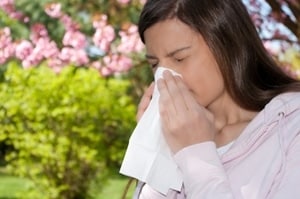
1. Head to the drugstore
If you combat spring allergies each year, go on a preemptive trip to your local drugstore to stock up on over-the-counter antihistamines, such as Claritin. Taking one each morning should reduce your symptoms, and can be supplemented by other over-the-counter products such as throat lozenges and eye drops (or home remedies like a neti pot).
2. Visit a doctor
If your over-the-counter medication just isn’t cutting it, make an appointment with your doctor or allergist to see if he/she can prescribe something stronger. Your physician may also be aware of new treatments that will be more effective than over-the-counter antihistamines.
3. Start the fight before the symptoms
Begin taking your medication before the onset of your allergy symptoms, preferably before pollen begins making an appearance in the air (generally sometime in February). Your allergy medicine will be most effective if it’s in your system before allergens appear.
4. Keep your home pollen-proof
Although it may be tempting to open your windows and enjoy the spring breeze, allergen levels are at their peak during this time of year and they’ll make their way into your home. Trust us: Keep your windows shut for a more pleasant spring.
5. Do your laundry regularly
When you’re outside, allergens attach themselves to your clothing. Regularly wash your clothes, bed linens and pillows to remove the pollen you’ve inadvertently brought into your home. Your hair also attracts allergens, so take a shower before bed each night.
6. Clean your home
It’s not just pollen that aggravates spring allergies: Dust and mold can make your symptoms even worse. Change your air filters and clean your home regularly to remove as many allergy triggers as possible.
7. Consume a healthy diet
Give your immune system a boost to fight your allergy symptoms by consuming a healthy diet and exercising regularly. Make sure your diet includes yogurt, fish, orange juice and other foods that help you fight infection.
8. Track allergen levels
The website of your local weather station may post daily pollen and mold reports, as will some smartphone apps. Try to plan your routine so you can avoid traveling outdoors when the pollen count is at its highest (between 5 a.m. to 10 a.m.).



